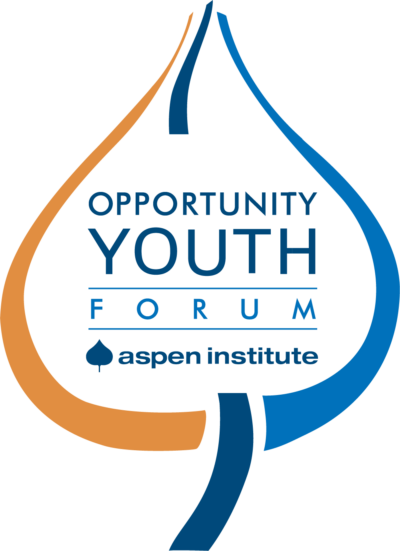
Young Adults Are the Experts
Engaging opportunity youth as experts and partners at every step has been a core principle of our work since the launch of the Opportunity Youth Forum. In line with the equity frame with which we approach all of our work, we embrace the concept of “nothing about us without us,” introduced by the disability rights community as a demand to center the expertise and leadership of people most affected by any given issue as participants to design solutions.
The Forum for Community Solutions and the Opportunity Youth Forum has made youth engagement a central pillar of this work because we believe that young people have the right to represent their own interests, identify their challenges, and design their own solutions. Our ultimate goal is to ensure that youth-led change is centered at the core of the opportunity youth movement, and that the sustainability of the work is secured by developing pipelines of engaged, diverse young leaders and organizers who can lead this work for future generations.
We believe that authentic youth engagement offers youth-serving organizations and systems important expertise and partnership, resulting in youth and adults coming together to co-construct systems that are more equitable, informed, and effective. At the same time, youth engagement provides young people with critical youth development opportunities to refine leadership and other important skills.
The Forum for Community Solutions and the Opportunity Youth Forum has made youth engagement a central pillar of this work because we believe that young people have the right to represent their own interests, identify their challenges, and design their own solutions.
We believe that to be authentic, youth engagement must involve youth participating in youth-adult partnerships that are designed to ensure that both young people and adults contribute to and learn from the experience. Without reciprocal approaches to learning that are integrated and include both youth and adult learning needs, youth may appear to have decision-making roles but may in fact have little input and simply serve as tokens or decorations.
Opportunity Youth Forum collaboratives have engaged youth in decision-making roles in authentic and meaningful ways. Across the Opportunity Youth Forum communities, collaboratives are challenging themselves to facilitate opportunities for youth to develop as leaders so that they are equipped with the tools necessary to effectively share their knowledge and lead their communities to better outcomes for themselves, their families, and their peers. Examples of this include:
- In Boston, the Youth Voice Project (YVP), comprised of trained youth leaders, serves in an advisory role to the Boston Opportunity Youth Collaborative. The YVP conducted research that identified that the city’s population of opportunity youth skewed toward 20-24 year-olds with a high school degree and made recommendations to the collaborative to focus on the critical needs of this population. As a result, the collaborative launched the Connection Center, a one-stop drop-in resource center where older youth can get connected to appropriate training, education, and career opportunities through one-on-one coaching, guidance, placement, and follow-up services. The Connection Center is the first of its kind in the country and is one of the major efforts and successes of the city’s recent reengagement efforts.
- In South King County, Washington, the Community Center for Education Results partnered with South King County and the United Way to employ a team of young adult peer connectors as outreach workers to facilitate the flow of information about available re-engagement options and to help opportunity youth access the programs that best fit their needs.
- In Maine, the Southern Maine Transition Network engaged youth in a variety of roles, including attending meetings; sitting on local, state, and national committees; serving in advisory roles; training partner staff in working with opportunity youth; and taking part in policy and practice conversations and awareness and education campaigns. Youth have become paid interns and staff in order to fill these roles, which are comparable to roles filled by collaborative staff and partners.
- In New Orleans, the Youth Action team implemented Undoing Adultism training for all collaborative members. This training was facilitated by Rethink New Orleans, a local youth advocacy organization staffed entirely by youth.
Additionally, the Forum for Community Solutions is a recipient of the BUILD award from the Ford Foundation that will support our efforts to align the field of opportunity youth and ecosystems focused on vulnerable youth, in partnership with Opportunity Youth United and the Opportunity Youth Network, with youth at the forefront of this movement. At the same time, we will work to infuse a healing-centered approach into our youth leadership framework in order to address the social and emotional needs of youth, including the need to heal from childhood trauma that can arise in the process of doing organizing and advocacy work. We seek to create a framework for youth leadership, organizing, and youth-led change that is centered in wellness and promotes safe, respectful, and thoughtful strategies and platforms for amplifying youth voice.
To learn more about our philosophy of youth leadership and youth-led change and this work in the Opportunity Youth Forum communities, please read our report, Including All Voices: Achieving Opportunity Youth Collaboration Success through Youth and Adult Engagement.